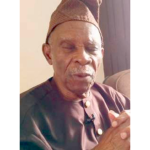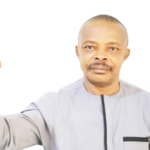Engineer Gboye Adegbenro is a Fellow, Nigerian Society of Engineering (FNSE), and a former Special Adviser and Commissioner for Works in Ondo State for eight years, having served under Governor Olusegun Mimiko. In this interview with YINKA OLADOYINBO, the Chairman/CEO, AGE Infrastructure Limited, speaks on the menace of building collapse, quality of engineering works and steps needed to be taken to have lasting projects in the country.
You served as a special adviser and a commissioner for eight years and now you have returned to your engineering profession, how has it been?
Yes, I was in public office for eight years. Before government, I worked as a consultant with my own engineering firm, AGE Consult Limited, and when I finished serving my state, Ondo, I came back to continue where I stopped and immediately relocated my office to Lagos. I commenced engineering practice fully and I have been involved in some projects within and outside Lagos. I major in structure when it comes to structural designs of buildings, highways, and all these civil works, and some of the projects are across the country. Currently, I am doing one in Lekki Phase One, a 5-floor design, and I am also building it. I have done some for private individuals, like construction of platforms, designing of a 2000-capacity auditorium for Elizade University, designing of a 400-capacity hostel for the same university.
As someone that majors in structure, what do you think is responsible for the frequent building collapse in the country and how can we resolve this?
It may interest you that I am currently doing my doctorate degree in FUTA and that is what I major in: addressing the issue of building collapse, especially in the Lagos axis. When it comes to that, there are many factors responsible — from the client angle, from the design, from the construction stage, even the ministry officials. There is a building I am doing now in Lagos as a case study. The first brief I got from the client was to do 12 units of three floors. Then he later changed his mind to make it 20 units and we had designed to construct piles of 18 meters depth, 89 in number, to carry three floors in that particular axis of Lekki Peninsula because of the soil condition of that place. So when he changed his plans to move it to five floors, we came back to the table and we added over 40 piles to make it 109 in total to be able to carry the five floors. But that was easy because we were still at the design stage. The building collapse that happened in Ikoyi — some of these developers want to maximize profit. If you design, say, two floors or three floors, they will say this thing can still be increased to five floors or more, and many times without going back to the basis. Some of these engineers are also not registered. They go into construction because of what they want to eat. They just assume that from their design it can still carry the increase. So, the clients have this habit of changing those that designed for them initially and giving it to another person without recourse to the person that designed it at the beginning.
Number two, at the construction stage, using full materials — like the one we are doing in Lekki now, I take my test every time to the laboratory of the University of Lagos to ensure that what I am using is to specification, but some would not do that. We have to consider the materials: the cement, the sand, the mixing ratio. Instead of the 1-2-4 designed by the structural engineer, they can say let’s use 1-3-6 because the builders are different from those that design the structure. But in a situation where the mechanical engineer, the structural engineer, the architect, the QS are together with the client and working on the same pace — those are the buildings that you see come out fine and nothing will happen. Also, those in charge of quality control — the ministry officials — are not competent. The senior officers will sit in the office and send their junior ones around, so they have bastardised the whole system.
So, a lot of things are responsible: poor design, poor materials and again the economy, because this has been making people manage materials. You don’t have to manage — let us build good structures that people will live and work in.
In terms of legislation, do we have quality laws that can help reduce the menace?
The laws that we have — do we follow them? Who are those enforcing those laws? We are not paying attention to what we should pay attention to in this country. We don’t pay attention to details. All that we enjoy in terms of infrastructure is the ceremony of flag-off by the governor or the president, commissioning — they bring live television, dancing — without paying attention to details.
Those supervising the projects — are they really doing their jobs? Are they really following the design submitted to the agencies? No. They are only interested in what will come into their pockets. And after the ceremony of the commissioning, do we care about what happens to the projects? What happens after? Nothing again, and the projects — be it roads or buildings — will start deteriorating. The agencies set up for maintenance of those infrastructure will not be there to do so.
For example, when I was commissioner in Ondo State, we had the Ministry of Works saddled with the responsibility of designing and construction of roads, and we had the Ondo State Road Maintenance Agency to be maintaining the roads. What I am saying is that the ministry constructs the road. Once they commission, OSARMCO takes over. The same thing we have at the federal level — we have the ministry and FERMA, the agency supposed to be maintaining the roads handed over to them by the ministry. It is not for FERMA to be awarding road contracts.
So, our problem in this country is maintenance. Government should pay more attention to maintenance than construction. Then, we won’t need to be constructing these roads over and over again. We were taught in engineering school that you design a road with a lifespan. So, if, for instance, Lagos–Ibadan road is designed for ten years, it means during that period you should not have anything doing on the road. And peradventure you have anything doing there, FERMA should be on ground to be maintaining them.
Look at Oba Ile to Airport Road in Akure, we used what we called stone base. I told the governor then that because there would be many vehicular movements and heavy trucks, we needed that. We also have many other roads we did when I was commissioner and I can beat my chest that those ones I supervised are still standing the test of time. This is because, being an engineer, I checked the design myself from time to time and followed all the tests from the laboratory of the Ministry of Works.
Another problem that I also see in governance is putting wrong persons in position. When you make a lawyer Commissioner for Works or Minister of Works, what would they know? But if you put the right person, he would know what to do. Such people will understand the language; they know the terminologies; they will do better. I am not praising myself — check the record of Ondo State, those that were there as commissioners who are engineers and those that are not. The records are there to speak.
After eight years, what can you say about the projects you left behind at the expiration of Dr. Olusegun Mimiko’s tenure?
You made mention of legislation the other time, and this is where I believe it is important. If most of the projects that governors are doing are being legislated upon by the House of Assembly, there will be continuity in governance. But if Mr. A is governor today and he is constructing a road to Ijoka and Mr. B comes tomorrow as governor and says he wants to construct a road to Sijuade — even though the one started by Mr. A is supposed to be completed — but everybody wants to shine. Everyone wants to say “this is my own project.” As a governor, you don’t have any project. The projects belong to the people. It is people’s money used for them.
ALSO READ FROM NIGERIAN TRIBUNE: Only 38.32% of candidates pass English, Maths as WAEC releases 2025 WASSCE results
For instance, when we came on board, we met some of the roads surface-dressed by the Olusegun Agagu administration and we decided to put asphalt on them so that those roads would be durable. And we opened up new ones and by the grace of God, we were able to complete most of our roads. At least 70 per cent of them were completed. Arakale, Fiwasaye 1, Airport were completed. We met only one dual carriage in Ondo State — that is Oba Adesida Road — and we gave it a face-lift. We added Democracy Park, we added bus shelters, we also worked on the pedestrian bridge (which is no longer in use today). Then we added five or six dual carriageways: Owo Phase 1, Ondo 1 and 2, Igbokoda, Ikare, which Aketi inherited and completed.
Our projects in the health sector have been abandoned. The Mother and Child Hospital is not what it used to be and it is a project that is very dear to Mimiko. When we were in government, we placed emphasis on urban renewal and I was given an award in FUTA for our efforts in urban renewal when it comes to cleanliness.
What should we expect from you politically in 2029, are you contesting?
Everybody wants the good things of life. I am qualified to run because I know I have what it takes to become governor. But I am not the type of person that says this is what I want to be. But I know that if today they say let us consider people from the Central, before they mention 10 names, my name will come up because of my antecedents and my name. I went into government and came out without blemish. I have tried senatorial election and dropped at a point. I was also deputy governorship candidate in the 2020 election. That shows you that I am still in politics and I have the qualifications to also become governor, if God is willing. But I won’t say I am putting my hat into the ring.
WATCH TOP VIDEOS FROM NIGERIAN TRIBUNE TV
- Let’s Talk About SELF-AWARENESS
- Is Your Confidence Mistaken for Pride? Let’s talk about it
- Is Etiquette About Perfection…Or Just Not Being Rude?
- Top Psychologist Reveal 3 Signs You’re Struggling With Imposter Syndrome
- Do You Pick Up Work-Related Calls at Midnight or Never? Let’s Talk About Boundaries






